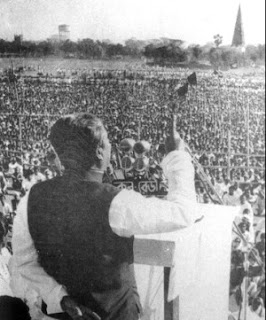Prime Minister
1947-51.......Liaquat Ali khan
1951-53......Khawaza Nazimuddin
1953-55........Muhammad Ali Bogra
1955-56......Choudhury Muhammad Ali
After the assassination of Liaquat Ali Khan, Pakistan first Prime Minister, in 1951, poliical power began to be concentrated in the President of Pakistan, and eventually, the military. The nominal elected chief executive, the Prime Minister, was frequently sacked by by the establishment , acting through the President.
East Pakistanis noticed whenever one of them, such as Khawaza Nazimuddin, Muhammad Ali Bograa, or H.S.Suhrawardy were elected Prime MInister they were swiftly deposed by the largely West Pakistani establishment. The Military dictatorships, of Ayub Khan (27 Oct 1958-25 March 1969) and Yahya han (25 March, 1969- 20 Dec 1971) both West Pakistanis, only highlightened such feeings.
The situation reached a climax when in 1970 the Awami League , the largest east Pakistani political party, led by Seikh Mujibar Rahman, won a landslide victory in the national elections . Bhutto also refused to accept Rahman's six points programme. On 3 March 1971, the two leaders of the two wings along with the president Gneral Yahya khan met in Dhaka to decide the fate of the country. Talks failed. Seikh Mujibar Rahman called a statewide strike.
On 7 March 1971, Mujibar delivered a speech at the racecourse (now called Suhrawardy Udayan). In this speech he mentioned a further four point condition to consider the national assembly meeting on 25 March;
1. The immediate lifting of martial law,
2. Immediate withdrawal of all military personnel to their barracks,
3. An inquiy into the loss of life,
4. Immediate transfer of power to the elected representative of the people before the assembly meeting 25 March..

He urged "his people" to turn every house into a fort of resistance. He closed his speech saying, Our struggle is for our freedom. Our struggle is for our freedom. This speech was considered main event that inspired the nation to fight fight for their independence. General Tikka Khan flown in to Dhaka to become governor of East Bengal. East Pakistani Judges, including Saddique, refused to swear him in.
Between 10-13 march, Pakistan International Air lines canclled all their flight for urgently flying Govt. passengers to Dhaka. The passengers were were almost soldiers etc. A unit of East pakistan Rifles refused to obey orders of west Pakistn's officers.




 Muhammad Ali Jinnah (right) taking oath from Justice Sir Mian Abdul Rashid (left) as Govenor General of Pakistan on 14 Aug, 1947.
Muhammad Ali Jinnah (right) taking oath from Justice Sir Mian Abdul Rashid (left) as Govenor General of Pakistan on 14 Aug, 1947. 




 London Highgate cematary of Karl Marx
London Highgate cematary of Karl Marx  Trotsky,Lenin and Kamenev,1919
Trotsky,Lenin and Kamenev,1919 Language is a basic element of the identity of a nation in the bourgeois society.Jinnah ignored such a basic element to create Pakistan. Specially Bengali is a rich languge which has created many international literatures. Created by Tagore, Nazrul and others. Only out of grudge on Hinduism ( though Bengali was not a language of Hindu only) he uttered "Urdu and Urdu only." But people, particularly students, of the then East Pakistan reacted strongly and spontaneously against this. In 21st Feb 1952, police of the reactionary govt. fired on an innocent and peaceful student's rally causing life of Rafiq,barkat, Zabbar and Salam and others.But their sacrfice toot the students a long way of struggle till the demand was fulfiied.
Language is a basic element of the identity of a nation in the bourgeois society.Jinnah ignored such a basic element to create Pakistan. Specially Bengali is a rich languge which has created many international literatures. Created by Tagore, Nazrul and others. Only out of grudge on Hinduism ( though Bengali was not a language of Hindu only) he uttered "Urdu and Urdu only." But people, particularly students, of the then East Pakistan reacted strongly and spontaneously against this. In 21st Feb 1952, police of the reactionary govt. fired on an innocent and peaceful student's rally causing life of Rafiq,barkat, Zabbar and Salam and others.But their sacrfice toot the students a long way of struggle till the demand was fulfiied.
